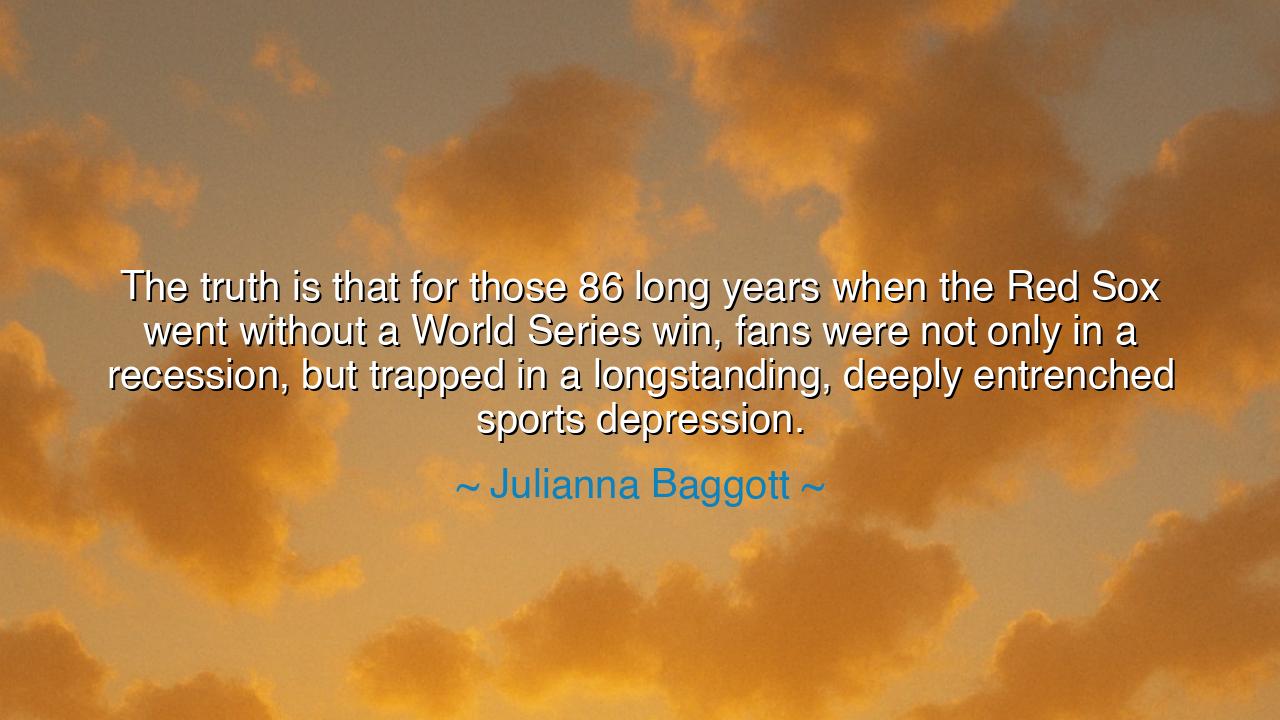
The truth is that for those 86 long years when the Red Sox went
The truth is that for those 86 long years when the Red Sox went without a World Series win, fans were not only in a recession, but trapped in a longstanding, deeply entrenched sports depression.






"The truth is that for those 86 long years when the Red Sox went without a World Series win, fans were not only in a recession, but trapped in a longstanding, deeply entrenched sports depression." Thus spoke Julianna Baggott, weaving not merely a tale of baseball, but of human suffering, endurance, and the strange alchemy of hope. Her words summon the shadow of the so-called Curse of the Bambino, that long drought when victory evaded Boston and its faithful. Yet beyond the sport itself, she speaks of something larger—the power of shared despair, and the way a community can carry sorrow across generations, turning longing into identity.
The 86 years of drought were more than numbers; they were lifetimes. Children grew to adulthood, fathers passed their love of the game to sons and daughters, and yet triumph remained elusive. Each October became a test of the soul. In this way, sport ceased to be mere entertainment. It became a symbol of suffering, of perseverance, and of the cruel patience demanded by fate. When Baggott calls it a “sports depression,” she does not speak lightly. For the heartache was real, borne like a national mourning in miniature, binding fans together through sorrow as tightly as joy ever could.
History is filled with such droughts of the spirit. Consider the long wandering of the Israelites in the desert, forty years of thirst and hunger, sustained only by the promise of a land they had not yet seen. Or think of the centuries when the Greeks longed to reclaim their freedom under Ottoman rule, keeping alive their songs, their myths, their prayers until liberation finally came. Just as the Red Sox faithful waited generation after generation for their World Series crown, so too have countless peoples endured long stretches of hope deferred, their identity formed in the crucible of longing.
In the tale of the Red Sox, the heartbreak was sharpened by moments of near-glory. In 1946, 1967, 1975, and most painfully in 1986, they came close to triumph, only to see it slip away. These failures deepened the entrenched depression, for it is easier to bear total defeat than to taste hope and then lose it. This rhythm of nearly winning, then falling short, mirrors the cruel ironies of life itself, where success sometimes comes within reach only to vanish, leaving the soul raw with yearning.
Yet there is heroism in such endurance. For though victory was absent, the fans did not abandon their team. They filled the stadium, told stories of legends like Williams and Yaz, and carried the memory of Fenway Park as a temple of devotion. Their sorrow became a shared inheritance, binding one generation to the next. When at last the curse was broken in 2004, the victory was not merely athletic—it was spiritual, a release of decades of sorrow, as though a people had been delivered from exile.
The lesson is this: in life, as in sport, we must often endure long seasons of apparent defeat. Hope may stretch across decades, even lifetimes, but it is hope nonetheless that binds us and gives meaning to the wait. Do not despise the years of drought, for in them is forged loyalty, patience, and strength of spirit. When triumph finally comes, it is made richer by the depth of the suffering that preceded it.
Practical action follows. When you find yourself in your own “86 years,” whether in career, love, or life’s battles, do not surrender to despair. Remain steadfast. Cherish the small joys along the way, the moments of near-victory that keep the flame alive. Bind yourself to others who share your burden, for community makes the weight bearable. And above all, believe that even the longest drought may one day end in a flood of joy.
Thus Julianna Baggott reminds us: the story of the Red Sox is the story of all humanity. We are creatures who wait, who suffer, who endure long nights of defeat. Yet when dawn finally breaks, it is brighter for the darkness that came before. The drought deepens the joy of the harvest.






AAdministratorAdministrator
Welcome, honored guests. Please leave a comment, we will respond soon